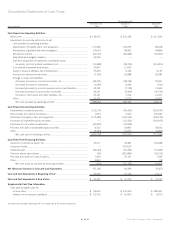Washington Post 2000 Annual Report Download - page 21
Download and view the complete annual report
Please find page 21 of the 2000 Washington Post annual report below. You can navigate through the pages in the report by either clicking on the pages listed below, or by using the keyword search tool below to find specific information within the annual report.
In August 1998, Junglee Corporation (“Junglee”) merged with a
wholly-owned subsidiary of Amazon.com Inc. (“Amazon.com”). As a
result, each share of Junglee common and preferred stock was con-
verted into shares of Amazon.com. On the date of the merger, a wholly-
owned subsidiary of the Company owned 750,000 common shares
and 750,000 preferred shares of Junglee. As a result of the merger,
the Company’s subsidiary received 202,961 shares of Amazon.com
common stock. The market value of the Amazon.com stock received
approximated $25,200,000 on the date of the merger. The gain result-
ing from this transaction, which is included in 1998 “Other (expense)
income, net” in the Consolidated Statements of Income, increased net
income by approximately $14,300,000 and basic and diluted earnings
per share by $1.42 and $1.41, respectively.
IK ICONTINGENCIES
The Company and its subsidiaries are parties to various civil lawsuits
that have arisen in the ordinary course of their businesses, including
actions for libel and invasion of privacy. Management does not believe
that any litigation pending against the Company will have a material
adverse effect on its business or financial condition.
The Company’s education division derives a portion of its net
revenues from financial aid received by its students under Title IV
programs (“Title IV Programs”) administered by the United States
Department of Education pursuant to the Federal Higher Education
Act of 1965, (“HEA”), as amended. In order to participate in Title IV
Programs, the Company must comply with complex standards set
forth in the HEA and the regulations promulgated thereunder (the
“Regulations”). The failure to comply with the requirements of HEA or
the Regulations could result in the restriction or loss of the ability to
participate in Title IV Programs and subject the Company to financial
penalties. For the year ended December 31, 2000, approximately
$35,000,000 of the Company’s education division revenues were
derived from financial aid received by students under Title IV Programs.
These revenues were earned and recognized by Quest following the
Company’s acquisition of Quest in August 2000. Management believes
that the Company’s education division schools that participate in Title IV
Programs are in material compliance with the standards set forth in the
HEA and the Regulations.
IL IBUSINESS SEGMENTS
The Company operates principally in four areas of the media business:
newspaper publishing, television broadcasting, magazine publishing, and
cable television. Through its subsidiary Kaplan, Inc., the Company also
provides educational services for individuals, schools, and businesses.
Newspaper operations involve the publication of newspapers in
the Washington, D.C., area and Everett, Washington; newsprint ware-
housing and recycling facilities; and the Company’s electronic media
publishing business (primarily washingtonpost.com).
Magazine operations consist principally of the publication of a
weekly news magazine, Newsweek, which has one domestic and
three international editions and the publication of business periodi-
cals for the computer services industry and the Washington-area
technology community.
Revenues from both newspaper and magazine publishing opera-
tions are derived from advertising and, to a lesser extent, from circulation.
Broadcast operations are conducted through six VHF television
stations. All stations are network affiliated, with revenues derived
primarily from sales of advertising time.
Cable television operations consist of cable systems offering basic
cable and pay television services to approximately 735,000 subscribers
in 18 midwestern, western, and southern states. The principal source
of revenues is monthly subscription fees charged for services.
Educational products and services are provided through the
Company’s wholly-owned subsidiary Kaplan, Inc. Kaplan’s five major
lines of businesses include Test Preparation and Admissions, providing
test preparation services for college and graduate school entrance
exams; Quest Education Corporation, a provider of post-secondary
education offering Bachelor’s degrees, Associate’s degrees and
diploma programs primarily in the fields of healthcare, business and
information technology; Kaplan Professional, providing educational
services to business people and other professionals; Score!, offering
multi-media learning and private tutoring to children and educational
resources to parents; and The Kaplan Colleges, Kaplan’s distance
learning businesses, including kaplancollege.com.
Other businesses and corporate office includes the Company’s
corporate office. Through the first half of 1999, the other businesses
and corporate office segment also includes the result of Legi-Slate,
Inc., which was sold in June 1999. The 1998 results for other busi-
nesses and corporate office include Moffet, Larson & Johnson, which
was sold in July 1998.
Income from operations is the excess of operating revenues
over operating expenses. In computing income from operations by
segment, the effects of equity in earnings of affiliates, interest income,
interest expense, other non-operating income and expense items,
and income taxes are not included.
Identifiable assets by segment are those assets used in the
Company’s operations in each business segment. Investments
in marketable equity securities and investments in affiliates are
discussed in Note C.
46 The Washington Post Company
























